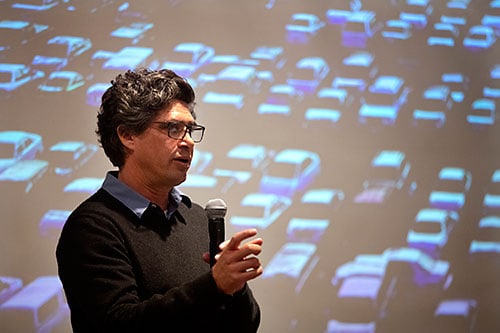Paid parking is a hard sell at Sustainable Claremont meeting

The controversial subject of paid parking in Claremont was revisited during Monday night’s Sustainable Claremont meeting.
Jason Neidleman, professor of political science at University of La Verne, preached the gospel of paying for parking during the group’s latest sustainability dialog at the Hahn Building.
Mr. Neidleman put forth the idea that free off-street parking is actually detrimental to cities like Claremont—it creates congestion, leads to inequity and hurts local businesses due to lack of turnover.
“What I’m going to argue tonight is we have to create a market for parking,” Mr. Neidleman said. “We have to price parking. Not necessarily a capitalist market because we the people collectively own the parking meters and the revenue from parking.”
The subject of paid parking has had a tumultuous history in Claremont. In October 2018, City Manager Tara Schultz and former Assistant City Manager Colin Tudor presented the idea to the Future Financial Opportunities Committee (FFOC) as a way to generate revenue in Claremont.
At the time, the city claimed that adding paid parking in the Village could generate up to $3 million annually, which would have been set aside for Village maintenance and capital improvement projects.
But Claremonters reacted negatively to the idea. One group, Transparent Claremont, created a Change.org petition urging the city to abandon the idea of paid parking in the village that boasted 936 signatures.
The city scrapped the idea in December 2018 after receiving nearly 1,500 mostly negative responses from residents. But it hasn’t been permanently tabled—at the FFOC’s presentation to the council in April 2019, Amanda Sabicer said the committee liked the proposal and “put it back up for conversation in the future, when we’re ready for it.”
Mr. Neidleman argued the cost of parking negatively affects both residential and commercial developments. Mandatory parking requirements in new housing developments lead to higher rents and inequity among poorer renters without cars, who would essentially be paying for parking spaces for wealthier residents with cars, he said.
“We accommodate cars for very little, but we’re doing a terrible job of accommodating human beings and housing,” he said.
Mandatory minimum parking is also expensive to include in a commercial development, he said—while parking is free on its face, consumers still pay for it through increased prices of goods to offset those parking costs.
“Retailers pass these high costs on to all shoppers, regardless of how they travel,” Mr. Neidleman said. “Even if you don’t drive, you’re still paying that cost.”
Parking requirements also lead to large swaths of lots that spread cities out and make them less walkable, Mr. Neidleman said. Each space is roughly 350 square feet, including space to get in and out—roughly the size of a small studio apartment.
He proposed a system called “performance-based parking,” which involves varying the price of parking based on demand. A popular location would have a relatively higher parking cost, while another area nearby would have a lower cost.
Mr. Neidleman said it would lead to less congestion through carpooling and taking alternative means of travel, such as public transportation and bicycles. The system would be audited regularly and priced accordingly.
He left open the idea of a discount for local residents, and stressed the money generated from the program must be given back to the community for it to be successful and to get locals on board.
The response from community members in attendance was tepid. Doug Lyon said the proposal goes against “freedom of mobility.”
“If we’re going to charge for parking, maybe we should start charging people to stand as well,” Mr. Lyon said. “The logic and the principle would be the same thing.”
Mr. Neidleman countered that there is an implicit reference to freedom in his arguments.
“I guess I would say how’s free parking with mandatory minimums working out? It seems to be not great depending on where you are,” he said. “Causing congestion, which you can see as a restriction on freedom of mobility.”
Donna Lowe called the proposal regressive, and “a prime example of how the poor get poorer” in the state, coupled with the gas tax and other state charges.
“It’s not who we are in Claremont, because we’re welcoming to all,” Ms. Lowe said. “And we feel as though everyone has the right to come here and enjoy our amenities. So if you put a price on parking, that prohibits those folks from coming here to Claremont.”
Mr. Neidleman said that the current system is regressive, “in the sense that poor people who don’t even own a car are paying so that rich people who do can have either free or very inexpensive parking.”
Mayor pro tem Jennifer Stark said the talk was “very interesting and thought-provoking” but stressed that Sustainable Claremont’s speaker series is not planned with the city nor was this specific talk city-initiated.
“However, with regard to our city, issues deserve our open minds and a willingness to mull over challenging ideas,” Ms. Stark said. “With all this said, I don’t see paid parking coming forward in the near future.”
—Matthew Bramlett
news@claremont-courier.com










0 Comments